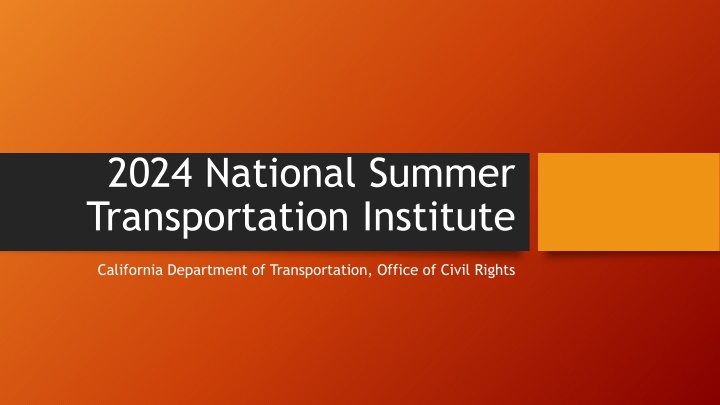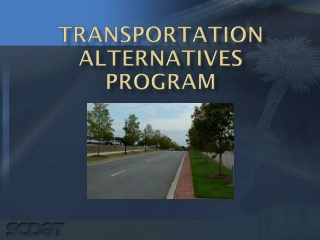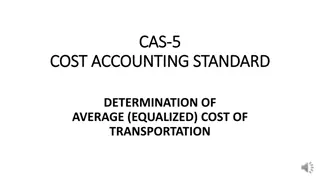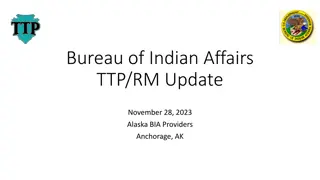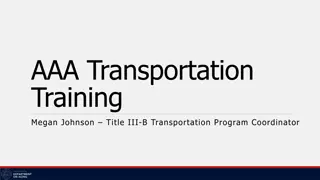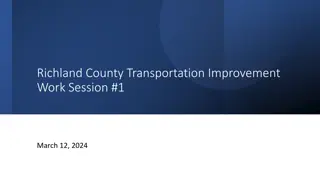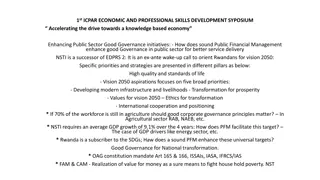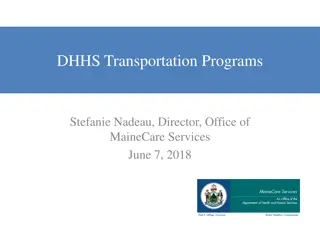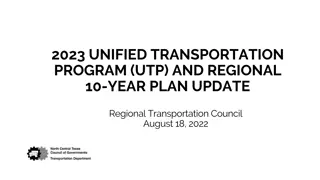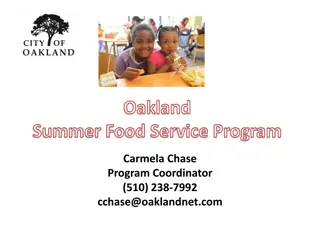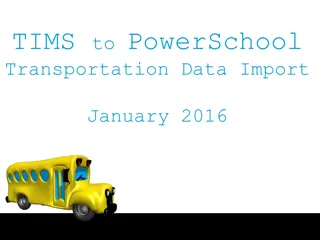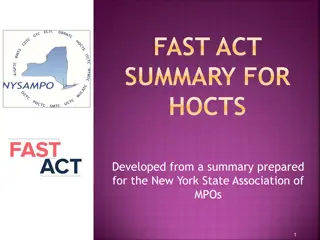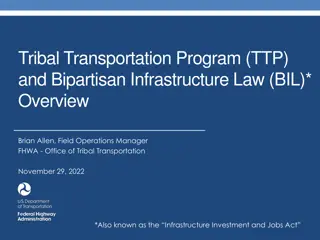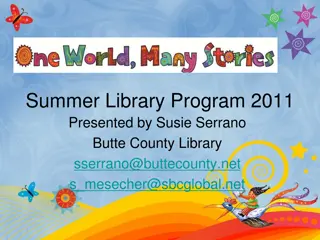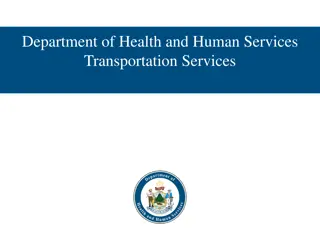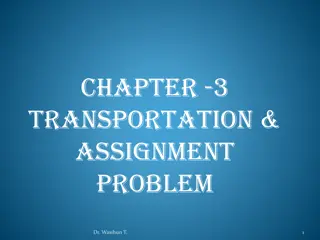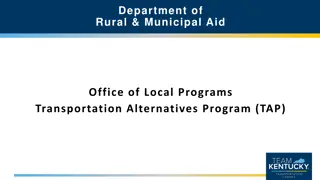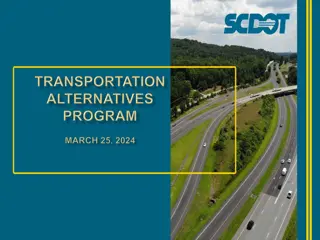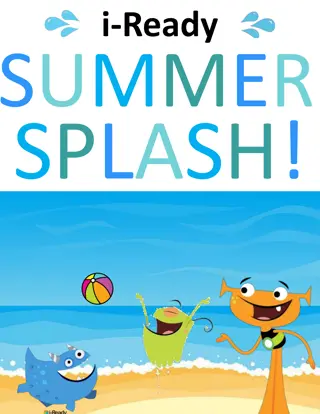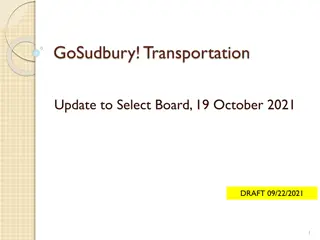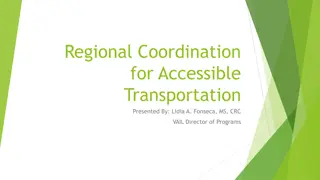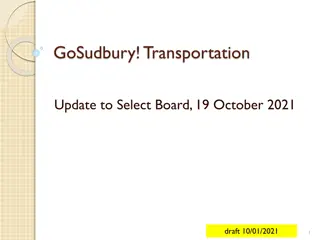National Summer Transportation Institute (NSTI) Program Overview
The National Summer Transportation Institute (NSTI) program, established by the Federal Highway Administration and Department of Transportation, aims to increase student interest in transportation careers and STEM fields. It offers a 2-4 week immersive experience at accredited colleges, focusing on career awareness and STEM literacy for grades 7-12 students. NSTI programs can be residential or non-residential, providing different experiences for middle and high school participants. Accredited colleges can apply to become host sites, and interested individuals can contact their local State DOT Civil Rights Office for more information.
Download Presentation

Please find below an Image/Link to download the presentation.
The content on the website is provided AS IS for your information and personal use only. It may not be sold, licensed, or shared on other websites without obtaining consent from the author.If you encounter any issues during the download, it is possible that the publisher has removed the file from their server.
You are allowed to download the files provided on this website for personal or commercial use, subject to the condition that they are used lawfully. All files are the property of their respective owners.
The content on the website is provided AS IS for your information and personal use only. It may not be sold, licensed, or shared on other websites without obtaining consent from the author.
E N D
Presentation Transcript
2024 National Summer Transportation Institute California Department of Transportation, Office of Civil Rights
What is the National Summer Transportation Institute (NSTI) Program? The NSTI program is a transportation-focused, career awareness educational initiative established by the Federal Highway Administration (FHWA) and the Department of Transportation (DOT). Congress authorized the NSTI program in the 23 U.S.C. 140(b). The program allows students the opportunity to spend 2-4 weeks receiving a realistic college preview geared at transportation related coursework at prominent, accredited college and university campuses.
NSTI Programs Purpose and Goals To address the need for a diverse workforce in the 21st Century transportation industry, and to increase the number of students pursuing advanced degrees in transportation-related Science, Technology, Engineering, & Mathematics (STEM) fields of study. To create an awareness and stimulate interest in transportation career opportunities among middle and high school students of grades 7-12. To increase STEM literacy for all students, including those pursuing STEM-related careers or additional study in a STEM discipline. A quality STEM program helps to develop critical thinking, reasoning, teamwork, investigative and creative capabilities for students to use in all areas of their lives.
Types of NSTI Programs A Host site can classify a NSTI program as either a Residential or a Non- Residential program. It cannot be both. Middle school programs should focus on career exploration, while high school programs should include activities designed to assist students in preparing for post-secondary education and an encouragement to pursue transportation-related careers. Residential program participants reside on the university or college campus, and include dorms, meals, and supervised access to campus facilities. Non-residential program participants commute to and from campus daily. All NSTI Programs should be 2-4 weeks.
Who can participate in the NSTI program, and who do I contact if interested? All accredited colleges and universities are eligible to serve as a NSTI host site for middle and high school student participants of grades 7-12 but must follow the application process. Accredited institutions who are interested in applying to become a host site should submit a completed Scope of Work application package to their local State DOT Civil Rights Office at: (NSTI@dot.ca.gov). Interested parents and students should contact their local State DOT Civil Rights Office (NSTI@dot.ca.gov).
Host Site Responsibilities Conduct either a Residential or a Non-residential program with a minimum of 15 participants. Develop and conduct a NSTI program with a focus of critical and systematic educational endeavors that explore all aspects of the transportation industry and its role in our society. Create a curriculum that introduces students to the diverse modes and disciplines in transportation modes including how transportation plays an integral role in our lives, as well details career opportunities that exist in today s transportation world. Plan and host a formal orientation meeting and a closing award ceremony program. The orientation should explain NSTI program expectations and provide a general overview of the program and expectations. Recruit middle or high school student participants of grades 7-12.
Continued - Host Site Responsibilities Distribute applications to public/private middle and high schools, alumni organizations, and other civic, fraternal, faith based, and community- based establishments within the school service area. Submit accurate and timely invoices to their State DOT and retain program files for at least 3 years after submittal of the final invoice. Collect and submit student demographic data with final invoice within 30 days of the program end date. Complete post-program survey, include feedback regarding observations, best practices, detail areas for improvement, and lessons learned.
Statement of Work (SOW) Components The SOW components are: 1. Program Information Host Site (Name/Address) Congressional District(s) Amount of funding requested Length of Program Type of Program (Residential or Non-residential) Anticipated Number of Students Grade Levels (7th 12th) & School type (middle, high)
Continued - SOW Components 2. Program Overview This is a brief statement of the purpose and anticipated outcomes of the program. 3. Program Administration Recruitment and Student Selection Procedures Staffing Requirements Program Cost, including budget (Excel) Inter-Modal Advisory Committee Specific Named Partners Implementation Schedule Program Curriculum o Academic Program o Enhancement Program o Sports/Recreation Program Conducting Follow-up Survey of Participants
Website for the NSTI Program The CA Department of Transportation s, Office of Civil Rights NSTI Program at: Caltrans NSTI Website
Federal Program Guidelines The NSTI program must follow all federal-aid financial requirements in particular: 2 CFR 225 Cost Principles for State, Local, and Indian Tribal Governments (OMB Circular A-87) 2 CFR 200 - Uniform Administrative Requirements, Cost Principles, & Audit Requirements for Federal Awards
Allowable Costs 2 CFR 200.403 Factors affecting allowability of costs. Except where otherwise authorized by statute, costs must meet the following general criteria to be allowable under Federal awards: a. Be necessary and reasonable for the performance of the Federal Award and be allocable thereto under these principles. b. Conform to any limitations or exclusions set forth in these principles or in the Federal award as to types or amount of cost items. c. Be consistent with policies and procedures that apply uniformly to both federally-financed and other activities of the non-Federal entity.
Continued - Allowable Costs d. A cost may not be assigned to a Federal award as a direct cost if any other cost incurred for the same purpose in like circumstances has been allocated to the Federal award as an indirect cost. e. Be determined in accordance with generally accepted accounting principles (GAAP), except, for state and local governments and Indian tribes only, as otherwise provided for in this part. f. Not be included as a cost or used to meet cost sharing or matching requirements of any other federally-financed program in either the current or a prior period. See also 2 CFR 200.306 Cost sharing or matching paragraph (b). g. Be adequately documented. See also 200.300 Statutory and national policy requirements through 200.309 Period of performance of this part.
Unallowable Costs The following costs are unallowable as per the cost principles prescribed in the regulations and are applicable to educational institutions: Cost of entertainment including amusement, social activities, and any costs directly associated with such costs (such as tickets to shows, sports events, meals, lodging, rentals, transportation, and gratuities). However, entertainment cost as part of a programmatic exercise program, such as a one-hour break to exercise as a team in a sporting event would be allowed. That is, funds used to pay for renting or using soccer equipment for a day, or paying for pool use fees, are allowed, as this is part of the college experience, thus, it has a programmatic purpose.
Continued - Unallowable Costs Caltrans Office of Civil Rights (OCR) wants to make it clear; it will not pay for visits to amusement parks for a fun day. On the other hand, OCR will fund field trips to transportation museums as part of a programmatic education experience. OCR recommends that host sites utilize the sports/recreational resources already available on the campus to fulfill this component of the program. You may wish to check with your State transportation agency to see if it can be used for this type of activity.
Statement of Work Application DUE DATE: January 5, 2024 by no later than 5:00 p.m.
NSTI Q&A Session Dates and Times December 11,2023 from 4:00 5:00 p.m. and December 15, 2023 from 4:30 5:30 p.m. Where: Virtual via Microsoft TEAMS Join on your computer, mobile app or room device Click here to join the meeting Meeting ID: 281 706 721 824 Passcode: UtTEpp Download Teams | Join on the web
